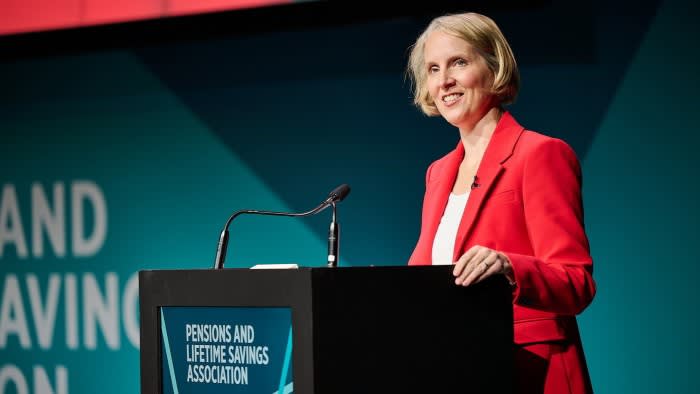Stay informed with free updates
Simply sign up to the Pensions industry myFT Digest — delivered directly to your inbox.
Forcing UK pension funds to buy British assets as a way of increasing domestic investment would be a “huge mistake” that could reduce payouts to pensioners, some of the country’s biggest investors have warned.
Major retirement schemes are concerned that the government could compel them to pour money into British stocks and infrastructure as part of its plans to revitalise the UK economy, a move that could mean they have to buy lower-quality assets at unattractive prices.
The warnings come after pensions minister Emma Reynolds at a conference in Liverpool this week refused to rule out such measures, saying that “we are considering all the options” when asked if the government could impose a minimum threshold for pension investors in the UK.
“Mandation would . . . be a huge mistake,” said Paddy Dowdall, executive director at the Greater Manchester Pension fund, which manages about £30bn of assets, adding there was a risk pension funds would be forced to buy at unattractive prices.
The proportion of UK pension fund assets held in domestic equities has tumbled in recent decades owing to a slew of regulatory changes that pushed corporate defined-benefit schemes into bonds, while funds have also derisked as they mature and wind down.
British funds held just 4.4 per cent of their portfolios in UK stocks, compared with a global average of 10.1 per cent for such domestic investment — one of the lowest proportions of any significant global pension market, according to a report from New Financial. Allocations to smaller companies have suffered the most.
Increasing this figure could be a way of attracting companies to list on the London Stock Exchange again and boosting domestic investment and growth, some commentators have suggested.
Reynolds told the Pensions and Lifetime Savings Association conference this week that she thought there was “quite a lot of potential to drive further investment into the UK”, although she added that the government “won’t be micro-managing”.
Chancellor Rachel Reeves has so far not supported mandating UK funds to invest in certain asset classes, but her allies said in August that there was a “live debate” on the issue, which has raised concern in the pensions industry.
The Universities Superannuation Scheme, the UK’s largest scheme with £78bn of assets, said forcing funds to allocate to the UK would be “wholly inconsistent” with trustees’ legal duty to invest for the best interests of their members.
“The mechanisms are already in place to allow for well-governed asset owners to access them [UK private markets],” it said in its response to the government’s call for feedback from industry last month on plans to channel pension fund money to help boost Britain’s economy.
“When you try to force an issue, the dynamics of the market will change and members will not get a good outcome,” said Steve Charlton, managing director at fund manager SEI, which runs a defined contribution scheme.
Investors point out that while Australia offers tax incentives to invest in domestic markets, none of the world’s most-lauded pension systems have forced schemes to allocate assets this way.
“Mandation is not a feature in any of the pension systems the UK is seeking to emulate . . . whether Australia, Canada, the US or the Netherlands,” Gregg McClymont, executive director at IFM Investors, whose UK investments include Manchester Airport Group and Anglian Water, told the Financial Times. “Major scale and schemes run by trustees are the key drivers.”
Gavin Lewis, head of BlackRock’s UK institutional client business, said that even if the government were to mandate, there still needed to be enough domestic opportunities for the UK’s £2.4tn pensions industry to invest in.
“I think it [the set of opportunities in the UK] needs to be larger. I’m not sure we have the scale now,” he told the FT.



